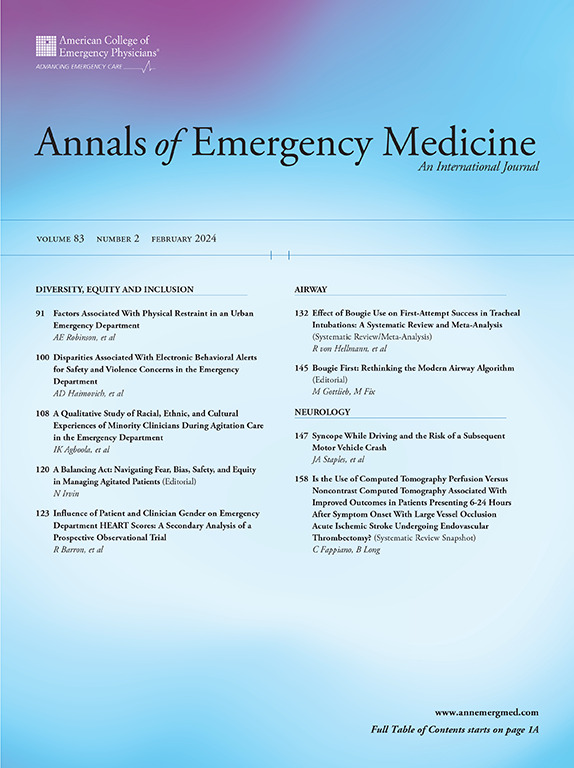Antibody-Drug Conjugates: The Toxicities and Adverse Effects That Emergency Physicians Must Know
IF 5
1区 医学
Q1 EMERGENCY MEDICINE
引用次数: 0
Abstract
Antibody-drug conjugates are novel antineoplastic agents whose use is expanding, both in terms of the number of drugs and the number of patients being treated. This article reviews the known toxicities and complications of antibody-drug conjugates that are currently approved for the treatment of cancer in the United States, with a focus on their emergency presentation and management. Similar to many other cancer therapies, most antibody-drug conjugates can cause diarrhea, nausea/vomiting, rash, peripheral neuropathy, and cytopenia, which are generally treated following standard-of-care. Interstitial lung disease, which may mimic pneumonia and cause respiratory failure and death, has been seen with trastuzumab deruxtecan and mirvetuximab soravtansine; emergency treatment of this condition includes oxygenation, ventilatory support, and corticosteroids. Inotuzumab ozogamicin and gemtuzumab ozogamicin are both associated with sinusoidal obstruction syndrome, a potentially fatal liver dysfunction that presents with weight gain, fluid overload, and jaundice. Abnormal liver function tests in patients who have been recently treated with these agents should be cautiously evaluated. Cardiac adverse events with antibody-drug conjugates are rare, but trastuzumab emtansine and trastuzumab deruxtecan may cause a decrease in cardiac contractility, and heart rate corrected QT interval prolongation is a rare effect of trastuzumab deruxtecan. Ocular adverse events, especially blurred vision, and keratopathy, are common with mirvetuximab soravtansine and tisotumab vedotin. Progressive multifocal leukoencephalopathy has been reported with brentuximab vedotin and polatuzumab vedotin. Tumor lysis syndrome may occur after treatment with gemtuzumab ozogamicin, polatuzumab vedotin, and brentuximab vedotin. Patients receiving enfortumab vedotin or brentuximab vedotin may develop hyperglycemia, sometimes presenting as diabetic ketoacidosis. Tisotumab vedotin and trastuzumab emtansine are associated with bleeding; although it is minor in most cases, severe bleeding and intracranial hemorrhage have occurred. Several antibody-drug conjugates can cause an anaphylactoid infusion-related reaction, which occurs most commonly during or soon after infusion but may be delayed up to 24 hours. Further research is needed to establish the real-world incidence of rare complications and how often patients with these complications present to the emergency department.
抗体-药物结合物:急诊科医生必须知道的毒性和不良反应。
抗体-药物结合物是一种新型的抗肿瘤药物,其用途正在扩大,无论是在药物的数量还是在治疗的患者数量方面。本文回顾了目前在美国被批准用于治疗癌症的抗体-药物偶联物的已知毒性和并发症,重点介绍了它们的紧急表现和管理。与许多其他癌症疗法类似,大多数抗体-药物结合物可引起腹泻、恶心/呕吐、皮疹、周围神经病变和细胞减少症,这些通常按照标准治疗。使用曲妥珠单抗德鲁德替康和mirvetuximab soravtansine可以观察到肺间质性疾病,可能模仿肺炎并导致呼吸衰竭和死亡;这种情况的紧急治疗包括氧合、通气支持和皮质类固醇。Inotuzumab ozogamicin和gemtuzumab ozogamicin都与窦状静脉阻塞综合征相关,这是一种潜在的致命性肝功能障碍,表现为体重增加、体液超载和黄疸。最近用这些药物治疗过的患者肝功能检查异常应谨慎评估。抗体-药物偶联物的心脏不良事件很少见,但曲妥珠单抗恩坦辛和曲妥珠单抗德鲁德替康可能导致心脏收缩力下降,心率校正的QT间期延长是曲妥珠单抗德鲁德替康的罕见效果。眼部不良事件,尤其是视力模糊和角膜病变,在mirvetuximab soravtansine和tisotumab vedotin中很常见。brentuximab vedotin和polatuzumab vedotin已报道进行性多灶性白质脑病。在使用吉妥珠单抗奥佐加霉素、polatuzumab vedotin和brentuximab vedotin治疗后可能发生肿瘤溶解综合征。接受强制维多汀或布伦妥昔单抗维多汀治疗的患者可能出现高血糖,有时表现为糖尿病酮症酸中毒。替妥妥单抗维多汀和曲妥珠单抗恩坦辛与出血相关;虽然在大多数情况下是轻微的,但严重出血和颅内出血也会发生。几种抗体-药物偶联物可引起类过敏输注相关反应,最常见于输注期间或输注后不久,但可能延迟至24小时。需要进一步的研究来确定罕见并发症的真实发生率以及这些并发症患者到急诊科就诊的频率。
本文章由计算机程序翻译,如有差异,请以英文原文为准。
求助全文
约1分钟内获得全文
求助全文
来源期刊

Annals of emergency medicine
医学-急救医学
CiteScore
8.30
自引率
4.80%
发文量
819
审稿时长
20 days
期刊介绍:
Annals of Emergency Medicine, the official journal of the American College of Emergency Physicians, is an international, peer-reviewed journal dedicated to improving the quality of care by publishing the highest quality science for emergency medicine and related medical specialties. Annals publishes original research, clinical reports, opinion, and educational information related to the practice, teaching, and research of emergency medicine. In addition to general emergency medicine topics, Annals regularly publishes articles on out-of-hospital emergency medical services, pediatric emergency medicine, injury and disease prevention, health policy and ethics, disaster management, toxicology, and related topics.
 求助内容:
求助内容: 应助结果提醒方式:
应助结果提醒方式:


